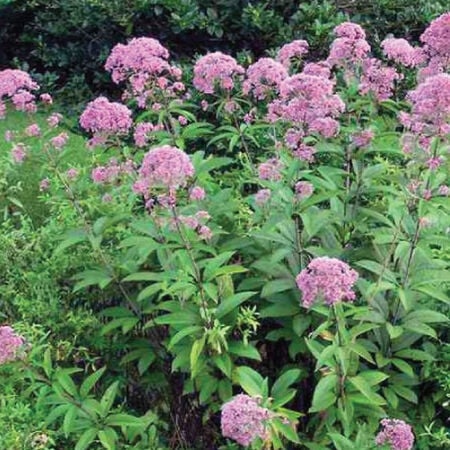Joe Pye Weed, Eutrochium Seeds
Key Attributes
Key Attributes
Product Details
Weight
0.01Depth
0.1Height
4.5Width
3.25Plant Height
3-5'Botanical Name
Eupatorium maculatumSeed Type
SeedAdditional Characteristics
Attracts Pollinators, Attracts Birds, Deer Resistant, Extended BloomsSeeds Per Gram
3,137Seeds Per Pound
1,422,400Packet
500 SeedsSow Depth
1/8"Seeds Per Ounce
88,900Breed
Open-pollinatedSun
Full SunUses
Bouquet Filler, Dry ArrangementsLife Cycle
PerennialSow Method
TransplantCategories
FlowersDays To Maturity (# Days)
100Components
Growing Instructions
![]() Learning Download: How to Grow Eutrochium
Learning Download: How to Grow Eutrochium
Although the Eutrochium is referred to as a weed, it has pretty blooms and can be very beneficial to the garden by attracting pollinators. This plant is a perennial that will return each year.
Before Planting: Prior to planting, rake the soil in which you will place the seeds.
Planting: Scatter the seeds across the top of the soil and water immediately after placing the seeds.
Watering: Eutrochium prefers the soil to be moist. Provide a deep watering regularly.
Fertilizer: Use a fertilizer specific for blossoming plants and apply it in the spring once the plant begins to show signs of new growth.
Days to Maturity: Eutrochium will typically bloom in the late summer to early fall.
Harvesting: To harvest seeds, place a mature seed head in a brown paper bag and shake it to loosen the seeds from the seed head.
Tips: Cut the plants back to 4 to 8 inches above the ground once it is done blooming. New growth will begin in the spring.
Shipping Schedule
Our Seed Promise
 "Agriculture and seeds" provide the basis upon which our lives depend. We must protect this foundation as a safe and genetically stable source for future generations. For the benefit of all farmers, gardeners and consumers who want an alternative, we pledge that we do not knowingly buy or sell genetically engineered seeds or plants.
"Agriculture and seeds" provide the basis upon which our lives depend. We must protect this foundation as a safe and genetically stable source for future generations. For the benefit of all farmers, gardeners and consumers who want an alternative, we pledge that we do not knowingly buy or sell genetically engineered seeds or plants.
The mechanical transfer of genetic material outside of natural reproductive methods and between genera, families or kingdoms, poses great biological risks as well as economic, political, and cultural threats. We feel that genetically engineered varieties have been insufficiently tested prior to public release. More research and testing is necessary to further assess the potential risks of genetically engineered seeds. Further, we wish to support agricultural progress that leads to healthier soils, to genetically diverse agricultural ecosystems, and ultimately to healthy people and communities.
To learn more about the "Safe Seed Pledge" please visit www.councilforresponsiblegenetics.org.

